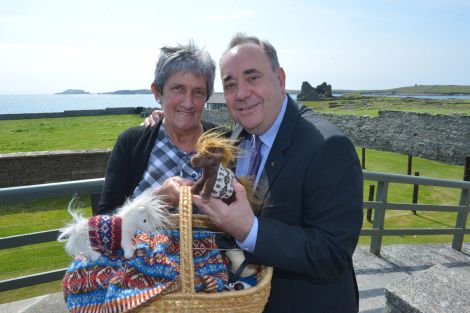News / Salmond “friendly” to more island powers
THE SCOTTISH government look set to respond positively to the Scottish islands claims for more devolved powers.
First minister Alex Salmond and his cabinet were welcomed by Shetland Islands Council convener Malcolm Bell and chief executive Mark Boden when they flew into Sumburgh airport on Wednesday lunchtime, delayed by about two hours due to thick fog, ahead of their cabinet meeting on Thursday.
High on the agenda is the joint Our Islands – Our Future campaign by Scotland’s island councils in Shetland, Orkney and the western isles seeking more powers regardless of the outcome of the 2014 referendum on independence.
Salmond said he was “friendly” towards the campaign, but would only respond to it publicly once he had discussed the issue with the council leadership.
He said: “The whole basis of the Scottish National Party is to have self-determination for the nation of Scotland and therefore it follows that we are friendly to requests and desire for local control.
“These two things go hand in hand: self- determination for Scotland and subsidiarity.
“Local control over local things is an aspect of the campaign we are very friendly towards.
“I will be giving a response to that at the public meeting on Thursday after, of course, discussions with the convener and the political leader.”
SIC political leader Gary Robinson said that extending devolution was one of the main issues the council wanted to raise this week.
“From my point of view the promise of devolution was always that it wouldn’t stop at Edinburgh, but effectively it did stop in Edinburgh,” he said.
“We believe the referendum next year offers the best opportunity we are going to have probably in a generation to bring the kind of powers into the islands that we think can help our economy.”
He said councillors were presented with a “unique opportunity” to lobby the government not only on the constitutional future, but also on issues such as the £40 million housing debt.
Become a member of Shetland News
The debt is an issue no UK government has been keen to get involved in.
Accrued in the early 1970s to build houses to accommodate oil workers, a verbal promise was made that Whitehall would pay off the debt.
Thanks to devolution the Scottish government now also has a stake in the matter.
The debt burden is likely to force the local authority to increase council house rents by 15 per cent next year, and prevents it from constructing much needed social housing.
The situation has been exacerbated by the influx of over a thousand of construction workers, who are building the new £800 Shetland Gas Plant, while nearby Sullom Voe oil terminal is also undergoing a major refurbishment.
As a result, Robinson says, local people are being priced out of the market.
“All this is putting an immense pressure on accommodation in the islands, and I am told that rents for some properties are as much as £2,000 a month.
“It is becoming increasingly difficult for local people to find affordable accommodation. That is a real issue at the moment.
“We still have a considerable amount of debt from the time we accommodated the first oil boom in Shetland, and that adds to the irony of the position we find ourselves in today.”
Local weekly newspaper The Shetland Times has gathered around 2,300 signatures calling on the UK and Scottish governments to write off the debt.
The petition is due to be handed over to the Scottish cabinet during their visit to the isles this week.
One of the driving forces behind the campaign, Shetland Times reporter Neil Riddell said: “We believe that this is a very important issue, because the consequences of the debt not being paid off is that council house tenants here will see a massive increase in rent.
“They did nothing to cause this situation and we don’t think that would be fair.”
The first minister acknowledged that Shetland was a special case, but added that other councils also had housing debts and housing budgets were under pressure.
He said: “In the Shetland case commitments were made in the 1970s by the Westminster government which weren’t redeemed.
“We made an offer earlier this year trying to help out with things. We are happy to continue discussion on that, bearing in mind that we have to be fair to every single parts of Scotland.”
Become a member of Shetland News
Shetland News is asking its readers to consider paying for membership to get additional perks:
- Removal of third-party ads;
- Bookmark posts to read later;
- Exclusive curated weekly newsletter;
- Hide membership messages;
- Comments open for discussion.
If you appreciate what we do and feel strongly about impartial local journalism, then please become a member of Shetland News by either making a single payment, or setting up a monthly, quarterly or yearly subscription.






























































